The iPhone 5 Review
by Anand Lal Shimpi, Brian Klug & Vivek Gowri on October 16, 2012 11:33 AM EST- Posted in
- Smartphones
- Apple
- Mobile
- iPhone 5
Six Generations of iPhones: Performance Compared
Section by Anand Shimpi
Cross platform smartphone benchmarks are interesting, but they do come with their own sets of issues. Before we get to that analysis however, let's look at how the iPhone's performance has improved over the past six generations. Luckily Brian has a set of all of the iPhones so he was able to run a few tests on all of the devices, each running the latest supported OS.
We'll start with SunSpider 0.9.1, our trusty javascript performance test:
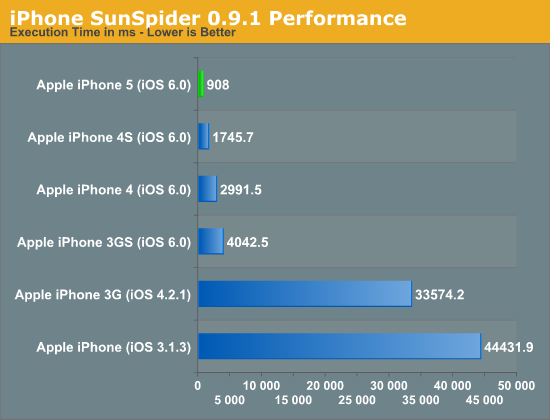
The transition from iPhone to iPhone 3G shows you just how much additional performance you can squeeze out of simply a software change. There's likely even more that could be squeezed out of that ARM11 platform, unfortunately newer versions of Safari/iOS aren't supported on the iPhone 3G so we're left with a runtime that's around 37x the length of a single run on the iPhone 5.
The rest of the devices support and run iOS 6, so we're at least on a level software playing field. The performance boost from one generation to the next is quite significant still. Going by this chart alone, the best balance of minimal upgrades and maximum perceived improvement would be from the original iPhone to the 3GS then again from the 3GS to the 5.
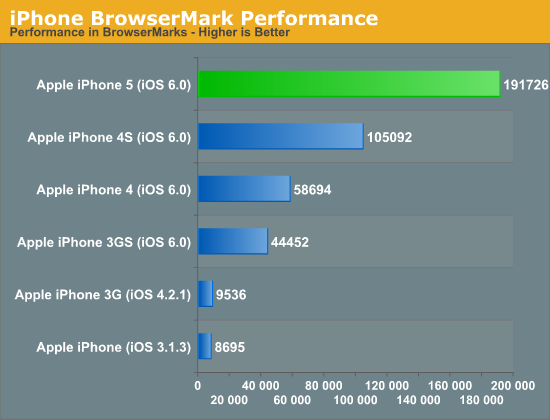
The BrowserMark results tell a similar story. The jump from the ARM11 based iPhone/iPhone 3G to the 3GS running iOS 6 is huge. Both the 4S and 5 offer doublings in performance, albeit for different reasons. The 4S delivered a doubling thanks to a doubling of core count and a move to the Cortex A9, while the iPhone 5 doubled performance through a much higher clock speed and microarchitectural improvements.
Finally we have Geekbench 2, which only runs on the iOS 6 supported devices so we say goodbye to the original iPhone and iPhone 3G:
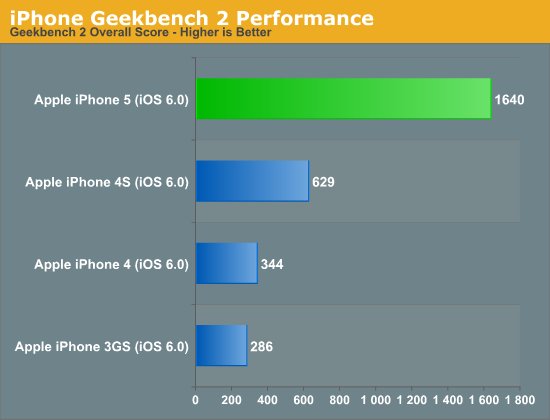
None of the jumps looks as dramatic as the move to the iPhone 5, but we already know why. The Swift CPU architecture does a great job improving memory performance, which shows up quite nicely in a lot of the Geekbench 2 subtests.
On the PC side we often talk about 20% performance improvements from one generation to the next being significant. It's clear that the mobile SoC space is still operating along a hyper Moore's Law curve. The rate of progress will eventually slow down, but I don't see that happening for at least another couple generations. The move to ARM's Cortex A15 will be met with another increase in performance (and a similarly large set of power challenges), and whatever comes next will push smartphones into a completely new category of performance.


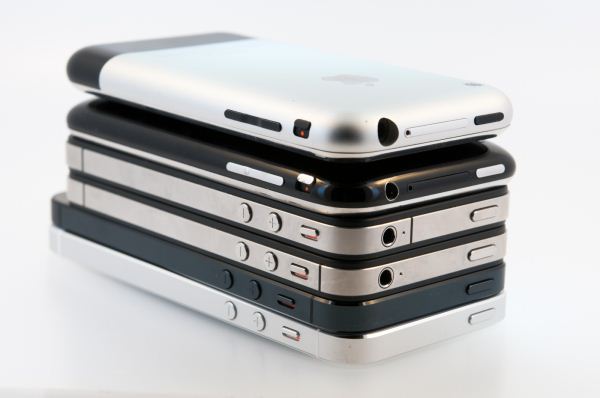
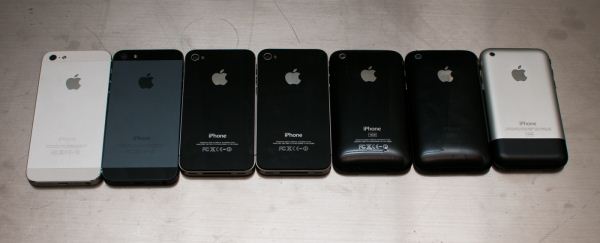








276 Comments
View All Comments
Sufo - Tuesday, October 16, 2012 - link
Agreed. If his goal is to fly the flag for apple (who clearly need no flag flying - look at their stock prices, but i digress...), and discredit its detractors, he's doing an awful job. But then again, I do detect a whiff of troll.Spunjji - Friday, October 19, 2012 - link
Word.doobydoo - Saturday, October 20, 2012 - link
Bragging? About being an engineer?LOL
dagamer34 - Tuesday, October 16, 2012 - link
If you wanted a "should I upgrade to this phone" review, there are hundreds of those reviews online. But AnandTech is pretty much the only place where you get a definitive review worth reading 5 years from now. They leave no stone unturned.Arbee - Tuesday, October 16, 2012 - link
Agreed. "Should I upgrade" is covered by literally dozens of newspapers, TV shows, and websites (Engadget, The Verge, Gizmodo, All Things D just to name 4). AT is the home of the 15+ page deep dive, and they do it just as well for Androids and Windows Phones.Also, I'm completely positive that if you sent Brian a GS3 with the iPhone 5's camera he'd write about it in exactly the same way. 2 weeks ago DPReview covered the iPhone 5's camera in a very similar way (including the same suggestions on how to avoid the problem, and a demonstration of inducing similar artifacts on the iPhone 4S and a couple of Android handsets). Optics is not a soft science, there is no room for fanboyism.
rarson - Wednesday, October 17, 2012 - link
I totally disagree. He brings up a completely valid point because Anandtech usually separates the reviews from the in-depth tech examinations. There's absolutely no need for the review to be 20 pages when most people are looking for benchmarks and hands-on impressions. Considering the fact that going this in-depth made the review late, it makes no sense at all.At least half of this information in this article doesn't even fall under the category of a review.
darkcrayon - Tuesday, October 16, 2012 - link
I think this type of review (hell, the site in general) is directed at people that want the maximum amount of compiled nitty gritty techy details... Notice his review was weeks after the larger more general consumer oriented sites. I think anyone wanting to know whether they should upgrade, that isn't interested in the technical details of the A6, would be better served reading those reviews anyway.Anand has said in previous reviews that he felt that iOS was intended to be more of an "appliance" OS. It's a pretty apt comparison of the two actually. That focus is why you can side load and more easily put custom software on Android, and also why you'll need anti-malware software for it before long as well. The point of an appliance is to have a reliable, consistent device that you spend more time using than tweaking.
daar - Wednesday, October 17, 2012 - link
Point taken, darkcrayon.I prefer AT's reviews because they do a thorough and unbiased job at detailing/benchmarking and comparing different products. The suggestion was that the info about the SoC be split on it's own. If Intel released a new chip, call it i9, and the first sample was from an Alienware notebook, I would simply be suggesting that the technical info about the chip have it's own post and not be combined with the review of the notebook is all.
I find it a bit strange that people are suggesting to go to other websites when I made the comment of comparisons to other products, and quite unlike most posts in AT reviews. If I make a comment about a few ATI features not being compared with Nvidia's, I would have been surprised to have people to tell me to go visit Tom's Hardware or the like.
Not to say there wasn't any comparisons, but rather in contrast to say, for example, the One X review where Brian made the comment of how the construction of the device felt better than the GS3. It felt like punches were being pulled in this review is all.
phillyry - Sunday, October 21, 2012 - link
Anand,I would like to know, however, how an Android device serves more as an all purpose device than an iPhone.
Did you mean because of its customisable skins or because it can do some things that an iPhone cannot - presumably because of Apple's strong hold ('death grip') on the OS?
This is pretty important to me because I am near the end of the term of my agreement and am in the market for a new 'phone'. I've considered W8P for precisely this reason but am waiting to see if they flop or not. I've always thought of Android as pretty darn similar to iOS but with slightly different interfaces and less user restrictions.
Is there some other factor that makes an Android any more like a pocket computer, like the future x86 W8P phones will presumably eventually be, and less like an iPhone than I have imagined?
phillyry - Sunday, October 21, 2012 - link
I also took notice of it when Anand referred to the iPhone as an appliance. Your remark saying, "The point of an appliance is to have a reliable, consistent device that you spend more time using than tweaking" would be comforting but I don't think that that's quite how Anand meant it. I was actually quite put off by the term because I think that he meant that the iPhone is made to be more of a tag along device that goes with your other Macs and plays a support role rather than a stand alone device. He pretty much says as much.Like I said, I found this a bit off putting but I think he's just saying how he sees it in terms of the respective companies' product lines and agendas. It actually makes a fair bit of sense. I found that when I got an iPhone it made me want an iPad. And then when I got an iPad it made me want a MacBook. Call it what you will but I remember thinking that they should be able to make it so that I can do everything I need to on an iPad but distinctly felt like I really needed a MacBook to really do all that I wanted. It could be argued, along the lines of Anand's original comment, that this is Apple's approach / business model.
It also points to a distinction between Apple and the other big player that no one in this forum is talking about - Microsoft. Windows 8 appears to be meant to be the exact opposite of this approach. Instead of one device for each purpose it's one device for all purposes. It will be interesting to see if Microsoft's approach with Windows 8 will turn things around or simply flop, at least on the handheld device side of things.